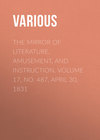Loe raamatut: «Ainslee's, Vol. 15, No. 6, July 1905», lehekülg 10
“I suppose I’ll have to ask her over to visit me,” he went on. “A fine hypocrite I’ll feel.”
“You can make it one of the conditions of your gift that she is not to thank you or speak of it,” said I. “I fear your face would betray us, if she ever did.”
“An excellent idea!” he exclaimed. Then, as he shook hands with me in farewell: “You will win her yet – if you care to.”
As I steamed up the Sound, I was tempted to put in at Dawn Hill’s harbor. Through my glass I could see Anita and Alva and several others, men and women, having tea on the lawn under a red and white awning. I could see her dress – a violet suit with a big violet hat to match. I knew that costume. Like everything she wore, it was both beautiful in itself and most becoming to her. I could see her face, could almost make out its expression – did I see, or did I imagine, a cruel contrast to what I always saw when she knew I was looking?
I gazed until the trees hid lawn and gay awning, and that lively company and her. In my bitterness I was full of resentment against her, full of self-pity. I quite forgot, for the moment, her side of the story.
XVIII
It was the next day, I think, that I met Mowbray Langdon and his brother Tom in the entrance to the Textile Building. Mowbray was back only a week from his summer abroad; but Tom I had seen and nodded to every day, often several times in the same day, as he went to and fro about his “respectable” dirty work for the Roebuck-Langdon clique. He was one of their most frequently used stool-pigeon directors in banks and insurance companies whose funds they staked in their big gambling operations, they taking almost all the profits, and the depositors and policy holders taking almost all the risk. It had never once occurred to me to have any feeling of any kind about Tom, or in any way to take him into my calculations as to Anita. He was, to my eyes, too obviously a pale understudy of his powerful and fascinating brother. Whenever I thought of him as the man Anita fancied she loved, I put it aside instantly. “The kind of man a woman really cares for,” I would say to myself, “is the measure of her true self. But not the kind of man she imagines she cares for.”
Tom went on; Mowbray stopped. We shook hands, and exchanged commonplaces in the friendliest way – I was harboring no resentment against him, and I wished him to realize that his assault had bothered me no more than the buzzing and battering of a summer fly. “I’ve been trying to get in to see you,” said he. “I wanted to explain about that unfortunate Textile deal.”
This, when the assault on me had burst out with fresh energy the day after he landed from Europe! I could scarcely believe that his vanity, his confidence in his own skill at underground work, could so delude him. “Don’t bother,” said I. “All that’s ancient history.”
But he had thought out some lies he regarded as particularly creditable to his ingenuity; he was not to be deprived of the pleasure of telling them. So I was compelled to listen; and, being in an indulgent mood, I did not spoil his pleasure by letting him see or suspect my unbelief. If he could have looked into my mind, as I stood there in an attitude of patient attention, I think even his self-complacence would have been put out of countenance. You may admire the exploits of a “gentleman” cracksman or pickpocket, if you hear or read them with only their ingenuity put before you. But see a “gentleman” liar or thief at his sneaking, cowardly work, and admiration is impossible. As Langdon lied on, as I studied his cheap, vulgar exhibition of himself, he all unconscious, I thought: “Beneath that very thin surface of yours, you’re a poor cowardly creature – you and all your fellow bandits. No; bandit is too grand a word to apply to this game of ‘high finance.’ It’s really on the level with the game of the fellow that waits for a dark night, slips into the barnyard, poisons the watch dog, bores an auger hole in the granary, and takes to his heels at the first suspicious sound.”
With his first full stop, I said: “I understand perfectly, Langdon. But I haven’t the slightest interest in crooked enterprises now. I’m clear out of all you fellows’ stocks. I’ve reinvested my property so that not even a panic would trouble me.”
“That’s good,” he drawled. I saw he did not believe me – which was natural, as he thought I was laboring in heavy weather, with a bad cargo of coal stocks and contracts. “Come to lunch with me. I’ve got some interesting things to tell you about my trip.”
A few months before, I should have accepted with alacrity. But I had lost interest in him. He had not changed; if anything, he was more dazzling than ever in the ways that had once dazzled me. It was I that had changed – my ideals, my point of view. I had no desire to feed my new-sprung contempt by watching him pump in vain for information to be used in his secret campaign against me. “No, thanks. Another day,” I replied, and left him with a curt nod. I noted that he had failed to speak of my marriage, though he had not seen me since. “A sore subject with all the Langdons,” thought I. “It must be very sore, indeed, to make a man who is all manners neglect them.”
My whole life had been a series of transformations so continuous that I had noted little about my advance, beyond its direction – like a man hurrying up a steep that keeps him bent, eyes down. But, as I turned away from Langdon, I caught myself in the very act of transformation. No doubt, the new view had long been there, its horizon expanding with every step of my ascent; but not until that talk with him did I see it. I looked about me in Wall Street; in my mind’s eye I saw the great rascals of “high finance,” their respectability stripped from them, saw them gathering in the spoils which their cleverly trained agents, commercial and political and legal, filched with light fingers from the pockets of the crowd, saw the crowd looking up to these trainers and employers of pickpockets, hailing them “captains of industry”! They reaped only where and what others had sown; they touched industry only to plunder and to blight it; they organized it only that its profits might go to those who did not toil and who despised those who did. “Have I gone mad in the midst of sane men?” I asked myself. “Or have I been mad, and have I suddenly become sane in a lunatic world?”
I did not linger on that problem. For me action remained the essential of life, whether I was sane or insane. I resolved then and there to study out a new course. By toiling like a sailor at the pump of a sinking ship, I had taken advantage to the uttermost of the respite Galloway’s help had given me. My property was no longer in more or less insecure speculative “securities,” but was, as I had told Langdon, in forms that would withstand the worst shocks. The attacks of my enemies, directed partly at my fortune, or, rather, at the stocks in which they imagined it was still invested, and partly at my personal character, were doing me good instead of harm. Hatred always forgets that its venomous shafts, falling round its intended victim, spring up as legions of supporters for him. My business was growing rapidly; my daily letter to investors was read by hundreds of thousands where tens of thousands had read it before the Roebuck-Langdon clique began to make me famous by trying to make me infamous.
“I am strong and secure,” said I to myself as I strode through the wonderful canyon of Broadway, whose walls are the mighty palaces of finance and commerce from which business men have been ousted by the cormorant “captains of industry.” I must use my strength. How could I better use it than by fluttering these vultures on their roosts, and perhaps bringing down a bird or two?
I decided, however, that it was better to wait until they had stopped rattling their beaks and claws on my shell in futile attack. “Meanwhile,” I reasoned, “I can be getting good and ready.”
TO BE CONTINUED
A LITTLE CHILD SHALL LEAD THEM
By Francis Metcalfe
In the region of South Washington Square there are many ancient dwellings which have fallen into uses which would make their original owners, who were the solid men of old New York, turn over in their narrow vaults in Trinity churchyard if they could know of them. Alien peoples, swarthy of skin and picturesque of dress, occupy and surround them, and strange industries are carried on under the roofs which once sheltered the families of the dignified old Knickerbockers who formed the aristocracy of the city.
In many of these transformed residences of the wealthy, after climbing many flights of stairs, whose quaint old mahogany balustrades have been marred by generations of careless movers, one comes to apartments which are provided with skylights and northern windows, and these, being classified as studios, command relatively high rents, considering the lack of every modern convenience and comfort. They are occupied by the younger and unknown artists, who cannot afford the rents demanded in the more fashionable studio buildings, and the reek of the oil stove and odor of cooking, mingling with the smell of paint and turpentine, which pervades the hallways, indicate that they are used as living quarters and work rooms combined.
The whole quarter abounds in cheap restaurants, places where one may obtain a full course dinner, of sorts, and a small bottle of alleged claret included, for an absurdly small sum; but a carton of biscuits, a tin of sardines and a can of condensed milk are usually in evidence on the littered tables of the studios, and, together with the odor of stale coffee, bespeak an economy of diet which is incompatible with the good work which comes of the well-fed body.
It was in one of these small rooms, perched at the top of the tallest among the houses, that a girl lay on a couch, her face buried in her hands, as the early dusk of a winter’s afternoon softened the tawdriness of the furnishings. A curtain of burlaps screened one corner, hiding the toilet arrangements, which would have suggested that the couch served as a bed by night; and the flowering plants at the window, the arrangement of artistic posters and sketches on the walls, and, above all, the neatness and orderliness of the room, proclaimed feminine occupancy.
Her attitude was that of dejection, and she had not waited to remove coat or hat before seeking consolation in the refuge of tears; but there was determination in her expression and in the set of her shoulders when she sat up and looked resentfully at the flat package lying on the table. The imprint of a well-known publishing house was on the wrapping paper, and in her hand was a letter from the same firm, thanking her for the privilege of examining the sketches and regretting that they were not fitted to their immediate needs. She lighted a gas jet and re-read the letter, trying to derive some comfort from the courtesy of the declination, but when she unwrapped the sketches, she was forced to acknowledge to herself that they did not seem so strong as when she hopefully submitted them a fortnight before.
These two weeks had been a time of anxiety for Elizabeth Thornton, for so much depended upon the sale of the sketches, the results of months of labor, that she had alternately built castles in the air and wondered what was to become of her, as her mood made her hopeful or despondent of their acceptance. She had sold some of her work during her three years of study in New York, but not enough to pay even her very modest living expenses, and these, together with the fees for tuition at the art school and the purchase of material, had diminished almost to the vanishing point the few hundreds of dollars which she possessed when she commenced her studies.
A knock on the door caused her to glance hastily around the room, to be sure that evidences of domestic occupancy were not scattered about, before opening it to the tall, good-looking young fellow who stood hat in hand, his fur-lined coat thrown open and an expectant smile on his face.
“I have climbed so many stairs that I am not sure whether I have reached heaven or the studio of Miss Elizabeth Thornton,” he said, breathlessly, in a cheery voice; but the girl, whose face was in the shadow while his was in the light, extended her hand and greeted him warmly.
“Tom, you irreverent boy! Come inside this minute, before you scandalize my neighbors,” she exclaimed. “And now that you are in, tell me how you found me out and how you happen to be in New York.”
“In the first place, I am fortunate enough not to find you out, and, secondly, I don’t happen to be in New York; I just live here, as I have done any time these past three years. But I didn’t know that you did until I met old Oliver, who gave me your address. I didn’t know whether it was your place of business or your dwelling; but I came on the chance of finding you.”
“And I don’t think you appreciate yet that it is both,” she said, an amused expression on her face, as she saw him glance around the room.
“Do you really live here, too?” he asked. The evidence of the studio was there, but none of the delicate and dainty traces of a feminine bedchamber.
“Indeed I do, and when it comes ‘by-low’ time, there is a grand transformation scene,” she answered, laughing; and, although he joined in her laughter, there was sadness in his heart as he realized the import of the meager accommodations.
“I don’t see a kitchen, at any rate, so I suppose there is no reason why you can’t come out to dinner with me this evening,” he said.
“Nothing but your presence, which prevents me from changing my gown,” she replied, doubtfully. “You can choose between walking the streets and sitting on the stairs outside while I get ready.”
“Don’t make it as long a proceeding as in the old days, then,” he said, as he stood by the table and carelessly turned over the sketches, and she smiled a little bitterly as she promised to hurry, realizing how little she had to select from as compared to the days when the choice from many gowns demanded due consideration. A flood of recollections came to her as she made her hasty toilet, and she appreciated, from the cheer and life which Tom Livingston’s brief presence had brought into the studio, how terribly lonely her life had been for the past few months. Before that there had been the companionship of her fellow students in the art school, many of the women struggling along like herself, living on the bare necessities of life and oftentimes knowing what it meant to lack for them, but stimulated and kept at their work by the hope of ultimate success in their painting.
The small glass told her that her face was still very attractive, although it had lost much of the girlish prettiness it possessed in the days when Tom had known and loved her; but then – thank Heaven! – she had never cared for such things, and all she wanted was success in her chosen profession, the one thing which she loved in life.
And Tom, on the other side of the door, was also thinking of her career and the visible results of her work since he had seen her; the small, cheap studio in the dilapidated old house and the lack of comfort in her mode of living, and he contrasted it with the home he had known her in and the things he could have surrounded her with, had she accepted his offer when the crash came which threw her on her own resources. She had elected to remain independent, to devote what little money had been saved from the wreck of her fortunes to pursuing her studies in painting; encouraged in her decision by the praise which her amateurish efforts had gained from sympathetic friends. But while the studies of the daughter of John Thornton, one of the most influential men of the city where they lived, might be praised by the good-natured reporters of the home papers at local exhibitions, the works of Elizabeth Thornton, of whose parentage and social position the critics neither knew nor cared, were judged on their merits when she asked that they be taken seriously, and they were found sadly wanting.
Tom could imagine the girl’s latter history from what he knew of the artists’ colony in New York; the years in the art school, where she had worked hard and no one had been sufficiently ill-natured or had cared enough for her to tell her to give it up, and then the misguided judgment which had led her to take a studio for herself. He had tactfully said nothing when he had looked over the sketches; but he knew that they were bad, and his sharp eyes had not missed the traces of tears on her face; so he easily made two, by the old process of putting one and one together, and formed a pretty accurate guess as to what had happened.
Elizabeth was all smiles when she joined him, and they went down the long stairs together. The dinner was a delight to her; the well-cooked and daintily served food, the pretty table appointments, and the music from the balcony, all seemed like a breath from the past – from the time before she became absorbed in what she called her “life work.”
“It is so long since I have been in such a delightful place as this, with the prospect of such a dinner, that you must not expect me to talk,” she said, when he had given the order, after due consultation with her over the menu. “But I am a good listener, and you can tell me about what you have been doing.”
“It is neither a very long nor a very exciting narration,” he replied, laughing. “You gave me such a very decided answer, three years ago, that I haven’t had the courage to look at a woman since, and if you can’t find a woman in three years of a man’s life, it is safe to say that it has been uneventful.” She looked at him apprehensively, for there was one topic which she had determined to avoid, and here he was rushing into it before the oysters were served.
“No, no. It isn’t that which I wish to know about,” she said, hastily. “But tell me what you have been doing; what you are doing now.”
“This evening I am dining with some one whom I have thought of every day since I saw her last,” he answered, gallantly. “During the day I spend most of my time in a disagreeable office, working for money which I do not need, because that seems to be the custom of American men. That has been my life for half of each of these three years; the alternate six months I have spent in Florence with my mother.”
“I envy you the Florentine portion of the year,” she said, looking at him a little wistfully. “Some day, when my ship comes in, I hope to spend a long time there.”
“I go back in two months,” he said, eagerly. “My mother would be delighted to see you, if you would come over with me.”
“Ah, but my ship may be delayed longer than that and – ”
“There is a ship always at your disposal, now as it was three years ago,” he interrupted, but she made a gesture of protest.
“It is good to see you again, Tom; it is nice to be with you. Please don’t make it necessary for me to send you away again. Let’s just be friends, and let me feel that I have your sympathy and affection in the struggle I am having with my life work.”
“You have both, always, little girl; but is it worth it, this ‘life work’? Is it enough to repay you for sacrificing all that other women find good in life? I wish that you would tell me about your troubles in it; your struggles and disappointments and what you hope for.” It was no easy recital which the girl entered upon, and her pride made her conceal a great deal; but from what Tom knew of her circumstances before she started in, and the conclusions he had drawn from what he had seen, he was able to read between the lines of her story.
“And so, you see, I am not able to do as good work as I should,” she faltered over the coffee. “I am ‘faking’ it all, because I cannot afford to use models, and what talent I may have is in the line of portraiture. But sitters don’t flock to South Washington Square, and it is hard to get a start.”
“Have you ever done portraits?” he asked, anxious to find a way to help her.
“No – that is, no paying ones. I have painted only two, and, like the country storekeeper, taken my pay in kind; but they were good, Tom – really they were, and I feel that if I could get such work to do I could make a name for myself.”
“Why not paint my portrait?” he asked, suddenly. “I have always longed to have my phiz, labeled ‘Portrait of a Gent,’ staring from the wall at an exhibition.”
“I’m afraid it would be from near the skyline, if my signature were on it,” she answered, laughing. “That is, if it were accepted at all; but you must understand, Tom, old boy, that I can’t accept your offers of help, even under the thickest of veils.”
“That is the beastly part of the conventions of this miserable world,” he answered, irritably. “Here am I, strong, healthy and with more of its goods than I can use, and yet you can’t accept from my surplus enough to tide you over a lean year or two, because Mrs. Grundy forbids.”
“But she is a very real and very terrible person; even to bachelor maids, Tom. If, like a sensible boy, you had married a sensible girl, whom you could send to me for her portrait, it would be different, for you would receive full value, and at the same time assist a struggling young artist.”
“By Jove, I have it!” he exploded. “I have not committed matrimony myself, but a lot of my friends have, and I am going to demand payment for all the teething rings, caudle cups and other baby truck I have been distributing, and make ’em all send their kids to you for their portraits.”
“Oh, Tom, you are a dear, but remember the size of my studio, and let them come one at a time,” she answered, laughing at his enthusiasm. “Remember that two babies would crowd it dreadfully, and I wouldn’t know how to get on with even one.”
“Never fear, you will pick that up fast enough, Betsy, and if you can deliver the goods, your fortune is made. What do you charge for the life-sized portrait of a baby?”
“Why, really, I haven’t a fixed price,” she answered, realizing that he was in earnest. “As I told you, I have painted but two portraits, and the payment for the last was the making of this gown. It was my dressmaker’s picture.” He looked her over critically.
“Well, it’s mighty becoming. I suppose that is equivalent to about five hundred dollars, isn’t it?”
“Oh, Tom! You are a greater baby than the sitters whom you propose to send to me,” she exclaimed. “If I become famous, I may ask that much years and years from now.”
“Young woman, you are to understand that you are ‘personally conducted’ in your new field, and I am your manager. It won’t do to cheapen your work by putting a small price on it. Make ’em pay, and they will think that you are great.”
“Not when they see my studio,” she answered, but his enthusiasm was comforting to her.
The little studio was not satisfying to Elizabeth as she transformed it into a bedroom by the simple process of bringing the bedclothes out from their place of concealment and sliding back the curtain. The unaccustomed luxury of the dinner had awakened old memories of the comfort and daintiness which had been unknown to her in her later life, and the rejection of her sketches had shattered the dreams of acquiring them again, which had comforted her when she sent them out. And Tom, bowling up the avenue in a hansom, felt uncomfortable at the thought of her being in such a place alone and unprotected, for the dinner had awakened memories in his mind, too, and renewed the old longing for Elizabeth which he thought the years of separation had conquered.
“But she is not the kind of a woman to come to me because she has made a failure, and, if she were, she would not be worth the winning,” he thought, bitterly, as he lighted his cigar. “A little more of the life she is leading now, a few more disappointments, and the woman that is in her, the part of herself which she has crushed back for the past three years, will be annihilated. I must find some way to rescue it, to rouse it, and when she has achieved, at least, a semblance of success, trust to my own good fortune to make her look at things as I want her to see them.”
It was a new proposition to him, and he racked his brain to find a way out, and by the time he reached his club he was in a mood to resort to physical violence, if necessary, to make any one of his married friends promise to deliver up a child for portrait purposes. But the club was deserted, and he went to bed to spend a wakeful night in seeking a solution of his problem.
Elizabeth smiled grimly the next day as she was preparing her frugal luncheon. A bunch of violets, whose value represented a half month’s rent of her tiny studio, was diffusing fragrance through it, and a basket of fruit, which would last a month, was on the table; but the necessaries were represented by a pot of tea, a package of biscuits and a small pat of butter. Even the last was an unwonted extravagance at midday, but, after the dinner of the night before, she could not descend too suddenly to dry biscuits, and, after all, Tom’s confidence had given her more courage for the future. She had even tried to work over the rejected sketches with a certain degree of hopefulness, but her heart was not in it, and she was gazing at one of them disconsolately, when there was a sharp knock at the door, and Tom, disregarding all studio ethics, burst in before she could open it. He seized both of her hands and whirled her about the room, to the grave peril of her modest bric-à-brac, his face beaming and his eyes sparkling with pleasure.
“Betsy, things are coming your way; I’ve caught one for you,” he almost shouted, and she implored him to be quiet and tell her what he meant.
“Why, a subject – a victim, or whatever you call people who have their portraits painted. No end of money and fame undying – but I haven’t time to tell you about it all now. Just let me know when you can commence, and I will have her here.”
“Are you in earnest, Tom?” she asked, incredulously; for the sudden realization of his prophecies of the night before seemed too good to be true.
“In earnest? Well, rather. Young woman, your foot is on the first rung of the ladder of fame, and the day is coming when I shall be proud to know you.”
“But who is it?” she persisted.
“Her name wouldn’t mean anything to you, and I haven’t time to tell you the story, but I will take you out to dinner to-night and tell you all about it.”
“But how old is she, Tom? I must know what to prepare for.”
“I wasn’t indiscreet enough to ask the lady’s age, but I should say about four years. I can see that there is no chance of getting anything but questions out of you; but I will make the appointment for ten to-morrow morning, and call for you at six-thirty tonight for dinner. Please be ready, so that I will not have to camp on those confounded stairs.”
Tom’s story at dinner was as delightful as a fairy tale to her, and if the first one had been made pleasant by anticipation, the feast of realization transported her to the realm of air castles. The arrival of the Italian family which had come from Florence to settle in New York, bearing letters of introduction to Tom from his mother, just in time to fit into his plans to make her a painter of children, seemed a harbinger of good fortune. The father had been most enthusiastic when Tom mentioned the “rising young artist” to him, and was anxious that the sittings should commence immediately, before her time was all taken up.
“There is only one drawback, Betsy,” said Tom, as he finished his story. “Little Carlotta speaks only Italian, so I will have to be there a lot to translate.”
“But won’t the mother, or some one, come with her?” she asked, in surprise.
“You would be no better off, for they can’t any of ’em speak English. I have promised to bring her and fetch her away, anyway.”
“Tom, I don’t know how to thank you for what you are doing for me; but it is awful to be under such an obligation to anyone,” she said, the tears coming to her eyes.
“If you think it’s any hardship to ride around in a cab with the young lady, just wait until you see her. She is a raving, tearing beauty,” he answered, laughing, but Elizabeth was none the less grateful.
Tom’s enthusiastic description of the child was borne out by the facts, and it was a very beautiful and very dainty little lady whom he carried into the studio the next morning. She was typically Italian, and the dark hair, warm, brown skin and large, soft eyes, gave her almost an Oriental expression, in spite of the conventional frills and furbelows in which she was dressed.
“Here she is, Betsy,” said Tom, gayly, as he sat down with the youngster on his lap. “Now tell me what you want her to do, and I will translate for you, for I must leave her with you while I go to the office.” Elizabeth looked at the child, who was gravely inspecting the studio with wise-looking eyes.
“But, Tom, suppose she should cry or anything; what am I to do? She can’t understand me, and I shouldn’t know what to say, anyway.”
“And this is what comes of being an independent woman,” he said, looking at her in disapproval. “Well, you will have to take a chance, and get on the best you know how, but I shall have luncheon sent in here, and come back to eat it with you, for I can’t trust the child’s diet to a bachelor maid.”
Carlotta was frightened when Tom left, and Elizabeth began, rather timidly, to comfort her; but she found it an easier task than she had imagined. The feeling of the warm young body against her breast, the sweet perfume of the child’s hair and the caressing touch of the little hands as they crept about her neck, were grateful to the lonely artist, and somewhere in the womanhood within her, she found words which Carlotta could understand, although they belonged to no language known to grownups. After the first feeling of strangeness had worn off, the child was quite contented with her, and so comfortable and comforting in her arms that but little progress had been made with the portrait when a waiter brought in the luncheon which Tom had ordered from a neighboring restaurant. Tom came back to eat it with them, and he was entirely satisfied with the friendship which had sprung up between the woman and the child.




















